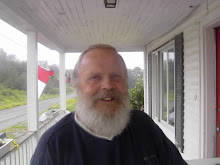A Key Piece of Canadian Rural History
On our recent motor trip, we had just left Owen Sound heading north toward the tip of the Bruce Peninsula. We were adviced to take the "scenic" shore road" along the sound. At a turn in the road we spotted and stopped at a small scenic lookout spot, which proved to be the only scenic spot on the route. Below is the road sign.
This lovely little spot by the side of the road was created by the local Kemble Women's Institute., as a memorial to the women of this rural area who have addressed the concerns of rural women: educational, social and political. I learned on the plaque below that this branch of the Institute is the oldest active branch in the World, founded in 1897, the year Women's Institute was founded.

Central to this parkette of a lookout is this wonderful sculpture of a table set for tea and cookies with an open book upon the table. It represents the countless gatherings of rural women around kitchen tables to discuss issues of importance to them.
"The table is set. Come sit and ponder our Kemble women, past, present and future making a better community for all."
I did just that for a moment. I thought of how the Women's Institute began at a time when so many rural women were isolated on farms, some still on the frontier in Canada. The Grey and Bruce counties are still very rural and for those who cling to the cities just 1 1/2 hours drive away is seems like wilderness. This was a time of few paved roads and no telephones in rural areas. Through the Women's Institute rural women connected with each other and had a voice. Local branch groups to this day continue to find ways to meet the needs of rural women, families and communities. As the plaque below notes there are 500 branches in Ontario and 9 million members around the World.
This is the plaque on the table. Click on it to enlarge it.
I was interested to notice on the plaque that Agnes Macphail and Nellie McClung, two early social activists were also from this rural part of Canada. Agnes MacPhail was Canada's first female member of parliament and largely responsible for improving Canada's prisons. ( The link about Agnes MacPhail has several interesting historical vignettes about famous early female activists, I encourage you to watch). Nellie McClung was responsible of getting women the vote in Manitoba and she was part of the five women who won the famous "person's case" when women we declared persons and thereby eligible to sit in the Senate.
When I read about the struggle for political rights in the early part of the 20th Century I need to remind myself that it wasn't that long ago. Women in many places in the world have yet to acquire such rights. We should not be so quick to judge their cultures. We are not that far ahead of them. In Canada women got the right to vote in 1918, following Manitoba and some other provinces. It was not until 1940 that Quebec finally ratified the act that gave women the vote. Hopefully, in places were women are just acquiring their "rights" progress going foward will be faster than it was for us. Women in Canada still have not achieved full and equal status with men.
The Women's Institute was founded in Stoney Creek, Ontario. A small rural community on Lake Ontario, at the beginning of the Niagara Peninsula. It was founded in the home of Erlund and Janet Lee with the inspiration of Adelaide Hoodless. The Erlund and Janet Lee Homestead is a museum today.
I was glad I stopped at this lookout overlooking the Sound for it reminded me of this important bit of Canadian history and the history of women's stuggles lead by rural women. Living in a rural area I am aware of the Women's Institute locally. I also once drove by an historic plaque in Stoney Creek that told me it was started in that small community. Beyond this I knew little. I did not know that it spread around the world, particularly among British Commonwealth counties. I think of how many places in the world where women could find such a women's institution useful in overcoming rural isolation through social, educational and political common learning and actio
I am always impressed by the local historical plaques as we drive around the countryside. So many people rose to do great things out of modest rural settings and situations. May it always be so.




![[thinkingblogger.jpg]](https://blogger.googleusercontent.com/img/b/R29vZ2xl/AVvXsEhd9OJMeQzSRU2nO1UwIYEiYq7Fy8kqyJou32tkxFyT5DF7GZKLPBVzTtUsTFfGkc6_eQomd-V7nrSg-JEGTRZS378_-eJNQsvb0GIC23MStmn9e0sFTlq_xZ4ZID58dzqFKGXb/s1600/thinkingblogger.jpg)










 Add The Indicator To Your Site
Add The Indicator To Your Site

 Free Typing Tutor
Free Typing Tutor
4 Comments:
You are a fount, which I think is more correct than font.
In Quebec, where I grew up, women only got the vote in 1940. Denying women the franchise seems the height of stupidity -- but that policy only disappeared a short time ago.
Philip--this is why I love visiting you by reading your blog--you never cease to give me a new tidbit of history. Without your words, I would be a less knowledgeable person.
I wonder how many little gems of history we all drive by everyday and never notice. In our busy lives, we seldom take time to think of, let alone thank, those who paved the way for the rest of us.
Thanks for sharing the moment.
Love the set table!
Post a Comment
<< Home